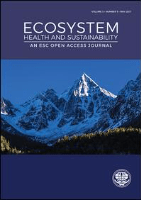
Ecosystem Health and Sustainability
metrics 2024
Connecting science and sustainability for a healthier world.
Introduction
Ecosystem Health and Sustainability, published by the American Association for the Advancement of Science, is a premier journal in the field of ecological research and sustainability. Established as an Open Access journal since 2015, it has made significant strides in disseminating impactful research that addresses contemporary challenges in ecosystem health within a global context. With an impressive impact factor reflected in its consistent placement in the Q1 category across multiple fields—including Ecology, Evolution, Behavior and Systematics, as well as Management, Monitoring, Policy, and Law—this journal serves as a vital resource for researchers, professionals, and students alike. Based in the United Kingdom, the journal has shown notable performance in Scopus rankings, positioning itself within the top percentiles across various ecological specialties. As it continues its convergence through 2024, Ecosystem Health and Sustainability is committed to fostering the exchange of knowledge and promoting the integration of science and policy to advance sustainable practices globally.
Metrics 2024
 1.02
1.02 4.20
4.20 5.00
5.00 38
38Metrics History
Rank 2024
Scopus
IF (Web Of Science)
JCI (Web Of Science)
Quartile History
Similar Journals
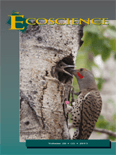
ECOSCIENCE
Fostering a community passionate about ecological advancements.ECOSCIENCE, published by Taylor & Francis Inc, stands as a prominent journal in the fields of Ecology and Environmental Science, recognized for its commitment to advancing knowledge since its inception in 1994. With an ISSN of 1195-6860 and an E-ISSN of 2376-7626, the journal caters to a diverse audience of researchers, professionals, and students passionate about ecological and environmental issues. In 2023, it achieved Q2 and Q3 rankings in the Scopus category of Ecology and Evolution, Behavior and Systematics, reflecting its significance within the academic community. Moreover, ECOSCIENCE occupies notable positions in Scopus rankings, including Rank #324 in Agricultural and Biological Sciences and Rank #210 in Environmental Science, symbolizing its role as a catalyst for disseminating high-quality research. Although currently not open access, the journal's multifaceted scope encourages in-depth discussions on ecological diversity, conservation strategies, and sustainable practices, making it an invaluable resource for those engaged in ecological research and practice.
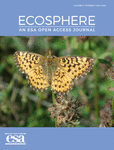
Ecosphere
Unveiling the dynamics of ecosystems through open access.Ecosphere is a leading open-access journal published by WILEY, dedicated to advancing research in the fields of ecology, evolution, behavior, and systematics. Established in 2010 and headquartered in the United States, this innovative journal provides a platform for the exchange of cutting-edge scientific knowledge and discovery, fulfilling its mission to enhance our understanding of ecological systems and their interactions. With a prestigious impact factor reflecting its commitment to high-quality research, Ecosphere is ranked Q1 in both Ecology and Ecology, Evolution, Behavior, and Systematics for 2023, further solidifying its prominence in the scientific community. The journal's scope includes a wide array of topics related to environmental science, making it an essential resource for researchers, professionals, and students aiming to stay at the forefront of ecological research. It offers comprehensive open access options, ensuring that groundbreaking findings are readily available to a global audience, thus fostering collaboration and innovation in the field.

ENVIRONMENTAL REVIEWS
Advancing Knowledge for a Sustainable FutureENVIRONMENTAL REVIEWS, published by Canadian Science Publishing, is a leading academic journal dedicated to the field of Environmental Science. With an impressive 2023 Q1 ranking in Environmental Science (miscellaneous) and a Scopus rank of #30 out of 233, it reflects the journal's substantial influence and contribution to the discourse on environmental issues. Launched in 1993, this journal provides a platform for critical reviews and innovative research in areas ranging from ecological sustainability to environmental policy, ensuring that it remains at the forefront of scientific inquiry. Although it currently does not offer open access, ENVIRONMENTAL REVIEWS continues to cater to a diverse readership of researchers, professionals, and students, fostering knowledge exchange essential for tackling contemporary environmental challenges. This journal not only strives to disseminate crucial findings but also aims to inspire informed decision-making and practical solutions to promote ecological welfare.
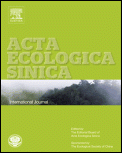
Acta Ecologica Sinica
Illuminating ecological challenges through rigorous research.Acta Ecologica Sinica, published by Elsevier, is a prominent journal in the field of ecology, with a strong focus on fostering understanding in ecological principles and their applications. Established in China, this journal holds an impressive Q2 categorization in both Ecology and Ecology, Evolution, Behavior and Systematics as of 2023, positioning it within the top tier of ecological research. With its Scopus rankings placing it in the 81st and 78th percentiles in relevant ecological domains, it serves as a vital platform for researchers and practitioners to disseminate findings that promote ecological sustainability. Although it operates under a traditional access model, its significant impact is underscored by its systematic convergence of key ecological inquiries across multiple years (2006-2008, 2014, 2017-2023). By engaging with the latest empirical studies, theoretical advancements, and methodological innovations, Acta Ecologica Sinica is indispensable for scholars dedicated to advancing ecological knowledge and addressing environmental challenges.

BIODIVERSITY AND CONSERVATION
Exploring the intricate web of life.Biodiversity and Conservation is a leading peer-reviewed journal published by Springer, dedicated to advancing the understanding of biodiversity and the critical aspects of conservation biology. With an impact factor that consistently places it in the Q1 category across multiple fields including Ecology, Evolution, and Nature and Landscape Conservation, this journal serves as a vital resource for researchers, professionals, and students who aim to address the pressing challenges of biodiversity loss and ecosystem management. Established in 1992, the journal has successfully created a platform for high-quality research and innovative approaches, facilitating the dissemination of knowledge that informs conservation practices globally. With a strong ranking in Scopus, it highlights the importance of rigorous scientific inquiry in the preservation of our natural world. Subscribers can access a wealth of articles that encompass a broad range of topics pertinent to both theoretical and practical aspects of biodiversity, encouraging an interdisciplinary dialogue among the diverse fields of environmental science and conservation.
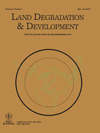
LAND DEGRADATION & DEVELOPMENT
Innovating pathways to combat land degradation.LAND DEGRADATION & DEVELOPMENT is a premier academic journal published by WILEY that has been at the forefront of research on the critical issues surrounding land degradation since its inception in 1989. With an impressive impact factor and ranked in the Q1 category across multiple fields including Development, Environmental Chemistry, Environmental Science, and Soil Science, this journal serves as an essential resource for scholars and professionals dedicated to sustainable land management and environmental conservation. Although it currently does not provide open access, its rigorous peer-review process ensures the publication of high-quality, impactful research that addresses vital environmental challenges. The journal aims to foster interdisciplinary collaboration, promote innovative solutions, and disseminate knowledge that not only informs policy but also empowers communities to combat land degradation effectively. Researchers, professionals, and students alike will find the insights and findings published in LAND DEGRADATION & DEVELOPMENT invaluable for advancing their understanding and practices within this critical field.
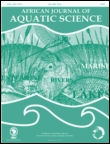
AFRICAN JOURNAL OF AQUATIC SCIENCE
Advancing aquatic knowledge for a sustainable future.AFRICAN JOURNAL OF AQUATIC SCIENCE, published by TAYLOR & FRANCIS LTD, is a premier scholarly journal dedicated to the field of aquatic science, ecology, and environmental management, playing a crucial role in advancing research and knowledge in these vital areas. With an impressive Q2 ranking in both Aquatic Science and Ecology, Evolution, Behavior and Systematics, the journal seeks to publish high-quality research encompassing a wide range of topics related to freshwater and marine ecosystems, including biodiversity, conservation strategies, and the impacts of climate change. Featuring a rich history of publication from 2000 to 2024, the journal not only embraces rigorous peer review but also aims to foster collaboration and dialogue among researchers, practitioners, and students interested in aquatic environments. Readers will find that the journal’s commitment to impactful scientific communication is reflected in its notable rankings within the Scopus database, making it an essential resource for those engaged in aquatic research and management.
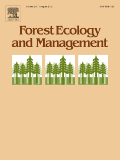
FOREST ECOLOGY AND MANAGEMENT
Elevating Knowledge in Forest EcosystemsFOREST ECOLOGY AND MANAGEMENT is a premier peer-reviewed journal dedicated to the integral study of forest ecosystems and their management, published by Elsevier in the Netherlands. With an impactful presence in the field, this journal boasts a prestigious Q1 ranking in multiple categories, including Forestry, Management, Monitoring, Policy and Law, and Nature and Landscape Conservation as of 2023. It addresses key issues relevant to sustainable forest practices, conservation strategies, and environmental monitoring, making it a vital resource for researchers, practitioners, and policymakers alike. The journal is indexed with an impressive Scopus rank, placing it among the top tier of titles in Agricultural and Biological Sciences and Environmental Science. While it does not offer Open Access options, its rigorous review process and high visibility make it essential for those seeking to stay abreast of the latest findings and trends in forest ecology and management. Published continuously since 1976, FOREST ECOLOGY AND MANAGEMENT aims to foster interdisciplinary collaboration and advance knowledge critical to the stewardship of forest resources in an ever-changing global landscape.
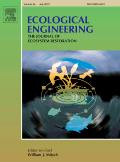
ECOLOGICAL ENGINEERING
Leading the charge in environmental stewardship and innovation.ECOLOGICAL ENGINEERING, published by Elsevier in the Netherlands, is a leading journal dedicated to advancing the field of environmental engineering and sustainable development. With an impressive impact factor and recognized as Q1 in multiple categories including Environmental Engineering, Management, Monitoring, Policy and Law, as well as Nature and Landscape Conservation, this journal stands at the forefront of environmental science research. It ranks among the top publications in its fields according to Scopus, reinforcing its significance with a notable position within the 90th percentile for Nature and Landscape Conservation. ECOLOGICAL ENGINEERING encourages open discourse and dissemination of innovative practices aimed at addressing contemporary ecological challenges, making it an essential resource for researchers, professionals, and students committed to sustainable practices and environmental stewardship. The journal’s comprehensive scope includes ecological restoration, habitat management, and policy implementation, ensuring a broad spectrum of relevant topics for its readership.

Nature Conservation Research
Connecting researchers and practitioners for a greener tomorrow.Nature Conservation Research is a prominent open-access journal that has been dedicated to advancing the field of conservation science since its inception in 2016. Published by the SARANSK FOND PODDERZKI & RAZVITIA ZAPOVEDNYH in the Russian Federation, this journal serves as a vital platform for researchers, professionals, and students alike, providing critical insights into ecological and environmental issues. With an impressive impact factor and ranked in the second quartile across multiple categories—including Agricultural and Biological Sciences, Earth and Planetary Sciences, Ecology, and Nature and Landscape Conservation—Nature Conservation Research stands at the forefront of impactful scientific discourse. The journal not only aims to disseminate high-quality research findings but also seeks to foster collaboration and innovation in conservation practices globally. By ensuring open access to its content, it promotes widespread dissemination of knowledge, crucial in the fight against biodiversity loss and environmental degradation. Researchers and practitioners contributing to the journal will find themselves at the convergence of science and conservation efforts, paving the way for sustainable ecosystem management.